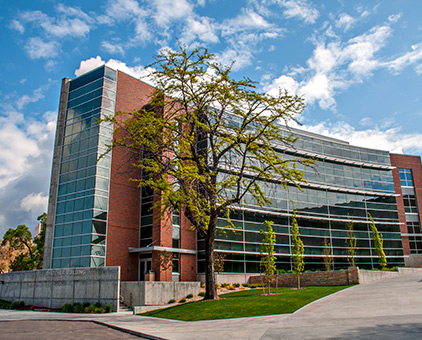Linguistics
Capstones
Program
Office of
Undergraduate Research
77
Declared
Majors
19
Average
Class Size
Courses
Getting Started
- Take LING 2200 - Intro to the Study of Language
- Discuss plans & explore interests with your advisor
- Familiarize yourself with the Degree Dashboard system
- Begin secondary language courses to complete the B.A. language requirement
Making Progress
- Take LING 3010 - Intro Phonetics and Phonology & LING 3020 - Intro to Syntax
- Determine your interests: TESOL, Computational Linguistics, Theoretical Linguistics, Second Language Acquisition, etc.
- Choose minor courses that complement Linguistics such as Computer Science, Criminology, or language courses offered in the Department of World Languages & Cultures
- Follow up with your advisor
Finishing Up
- Participate in the Senior Capstone & TESOL Practicum
- Take courses on the structure of other language families
- Meet with your advisor to make sure you're completing all requirements
Community
Getting Started
- Join LCU
- Attend department & campus events; check out the linguistics website calendar & the events page at utah.edu
- Explore the Linguist List website & the LSA site to see what other linguists are doing
Making Progress
- Join a research community such as the Speech Lab
- Organize NACLO
- Go on an Alternative Spring or Fall Break
- Explore learning abroad opportunities
- Get to know faculty outside of the classroom by attending colloquium events & office hours
Knowledge & Skills
Getting Started
- Explore areas of linguistics in core courses & 3000-level electives
- Apply for scholarships
- Meet with a Career Coach in the CPDC
- Learn about resources at the library like the Writing Center
Making Progress
- Concentrate on your favorite area of linguistics in advanced courses
- Gain practical experience through internships & volunteer opportunities; watch for the Linguistics/TESOL opportunity email
- Attend UUSCIL and URS
- Broaden your skill set by speaking with faculty & taking courses that complement linguistics & your interests
Transformation
Getting Started
- Try an area of linguistics you've never heard of
- Attend Plazafest & explore student clubs
- Explore minors to complement linguistics
- Find out what interests you by speaking with other students, faculty, and alumni
Making Progress
- Take on a leadership position in a club or start your own
- Attend department events: LCU, Colloquia, UUSCIL
- Decide what path you want to take for your major
- Speak to your academic advisor to find Gen Ed courses that connect linguistics to other disciplines
- Explore the A-Z index on utah.edu to find new opportunities & experiences
Impact
Getting Started
Making Progress
- Find volunteer opportunities that connect personal & academic goals - visit the Bennion Center or take a CEL course to explore options
- Go on an Alternative Spring or Fall Break
- Join LSA student groups/opportunities
- Take TESOL courses
Careers
Getting Started
- Meet with a Career Coach
- Attend department colloquia & connect with faculty/presenters
- Start researching opportunities provided by the LSA
Making Progress
- Review & edit your resume
- Attend career events on campus
- Discuss career options & paths with faculty
- Speak to alumni about their career paths
- Read the department newsletter
Finishing Up
- Polish your resume & tailor it to jobs of interest
- Practice mock interviews
- Talk to faculty to get letters of recommendation & application strategies
Start Your Career Journey
Find support at the Career and Professional Development Center (CPDC)
About the Major
Linguistics is the scientific study of language, one of the defining aspects of being human. As a linguistics major at the U, you will examine how we learn language, how we use it in our daily lives, and how it is structured in our minds. Linguistics informs a wide variety of human concerns. You will have the opportunity to apply your studies to real world issues. Such issues include: education, foreign-language teaching as well as nonstandard dialects in the classroom, the use of technology through speech recognition and artificial intelligence, health care practices through diagnosis and treatment of language disorders, and/or incorporation of the interpretation of legal language and the significance of linguistic evidence. You will also explore language's place in a diverse society, the role of multilingualism and protections for endangered languages and minority dialects. In addition to gaining a foundational understanding of the scientific approach to language, you can personalize your major based on your interests, passions, and future goals. You can take courses like computational linguistics, language and social justice, language acquisition by children or adults, psycholinguistics, second-language teaching, and advanced courses in syntax, phonology, and semantics. The linguistics program at the U also offers a certification in Teaching English to Speakers of Other Languages (TESOL) and provides a variety of opportunities for hands-on research experience with faculty members. In learning to analyze languages, you will also develop reasoning, critical thinking, analysis, and written and verbal communication skills that prepare you to be highly competitive in today's job market.
Learning Outcomes
- Gain competency in research techniques commonly used in linguistics.
- Work with linguistic data to create a rigorous analysis.
- Communicate your own analyses of linguistic data to a broader audience.
- Use the study of linguistics to understand language, people, and society as a whole.
- Engage in a meaningful learning experience that prepares you for your long-term goals.
Plan & Prepare
At the U, we plan for our students to have an exceptional Educational Experience identified by four broad categories we call the Learning Framework: Community, Knowledge & Skills, Transformation, and Impact. This major map will help you envision, explore, design, and plan your personalized Exceptional Education Experience with the Learning Framework at the core. In addition to assisting you in planning your coursework and navigating the requirements of your major, this map will help you incorporate other kinds of experiences to expand your knowledge, support your development, and prepare you for the future you want.


